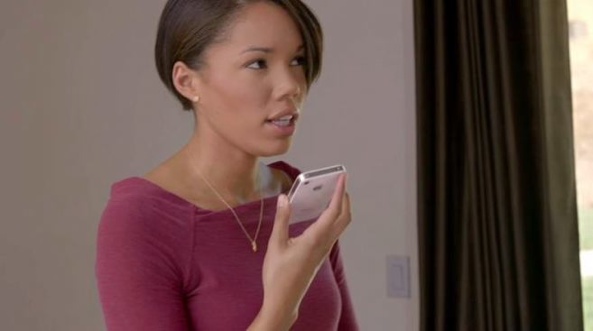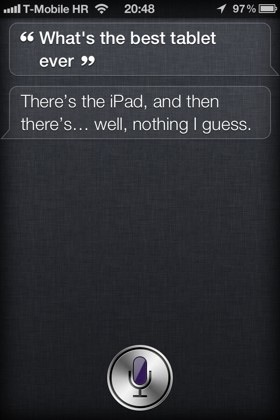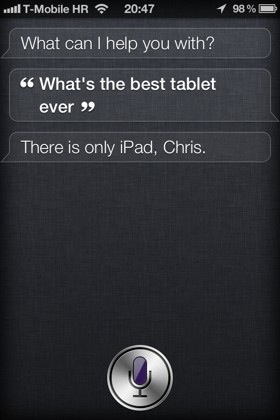Digital secretary Siri was, and still is, the headline feature of the iPhone 4S. It owes some of its allure to the vast processing power of Apple’s servers that run a remarkably sophisticated voice recognition software licensed from Nuance, a Burlington, Massachusetts-based provider of arguably the best voice technology money can buy.
According to Nuance’s marketing honcho, you can bet on Siri to improve over time. Upcoming developments in personal assistants will enable new stuff, such as more accurate voice recognition and personalization. So yeah, eventually you’ll be able to ask Siri “Is my favourite movie on tonight?”
Peter Mahoney, Nuance’s chief marketing officer, sat down for an interview with The Telegraph‘s consumer technology editor Matt Warman to talk voice recognition and Siri.
Nuance, which has far and away the most intellectual property in speech synthesis technologies in the industry, runs an astounding two billion annual “voice transactions” and the figure excludes Siri, Mahoney told the British paper.
Siri was “driving a real, unprecedented renaissance in interest around voice”, he said, noting Apple is mainstreaming voice technology just as they had popularized digital music or the computer mouse.
As soon as Siri got out there, every consumer manufacturer says ‘I want one of those’ – a new bar has been set.
Sure enough, Nuance also powers voice navigation on Samsung-made Smart TV sets. Its voice recognition is also behind S-Voice, a Siri-like feature of Samsung’s flagship Galaxy S III smartphone, demoed in the below clip.
Interestingly, S-Voice was developed by Vlingo, a company which Nuance is in the process of acquiring.
[tube]61I97JKORDE[/tube]
As for future Siri enhancements probably stemming from improvements to Nuance’s voice recognition, the article noted:
Future versions of voice recognition will move beyond Siri’s current version, which offers navigation, web search and the ability to write emails or set reminders. Mr Mahoney said upcoming developments in personal assistants would feature on tablets and would be more personalised, allowing users to ask questions such as “Is my favourite movie on tonight?”.
It should be noted that Siri was created from the ground up to be independent of the underlying voice recognition technology.
Originally, the initial Siri used Vlingo’s voice technology (not the Siri app that was on the App Store, mind you). Since its speech recognition component is modular, Apple could easily replace Nuance in Siri without too much trouble if a better speech recognition comes along.
As you know, Siri was born out of an artificial intelligence project started in 2003 by the US Government. Funded by DARPA as part of its Personal Assistant that Learns project and called the Cognitive Assistant that Learns and Organizes (CALO), it remains to date the most ambitious AI project in the US Government’s history.
The CALO project ran for five years and brought together more than 300 researchers from 25 of the top university and commercial research institutions.
It was coordinated through SRI International in Menlo Park, California. In 2007, SRI took the IP and some of its key players and formed Siri.
In addition to Siri technology, SRI also launched Nuance as one of its incubated companies in 1995 and it IPO’d in 2000.
Here’s semantic web genius Tom Gruber speaking at Semantic Web in 2008, just before Siri went public.
Apple acquired Siri in April 2010 for a rumored $200 million, turning its founders into instant paper millionaires.
The Siri feature would debut as an iPhone 4S exclusive on October 4, 2011 and pushed by over-the-top advertising. One of the anecdotes has it that Steve Jobs originally hated the Siri name.
Uncharacteristically for Apple, Siri was labeled as a beta product (here’s why).
Siri’s co-founder and board member Norman Winarsky likened the Siri launch to a “world-changing event”.
More than seven months since its debut Siri still carries a beta tag.
That doesn’t stop Apple from advertising Siri heavily. Just last month, the company aired two new iPhone 4S commercials starring Samuel L. Jackson and Zooey Deschanel.
[tube]Y5Dt0YlN2nM[/tube]
And guess what?
Apple has not indicated when Siri will exit beta, even though they’ve been perfecting its various aspects and added more languages. It’s also said that iOS 6 will bring third-party support to Siri, letting you talk to your favorite apps.
Needles to say, the controversial feature also got Apple in trouble with both end-users and rivals such as Nokia.
And being the jokers they are, folks at Cupertino sometimes tap Siri to both amuse and tease the media and users alike.
Try asking her what’s the best tablet. Repeat the question to get differently formulated answers.
What’s your take?
Is Siri just a passing fad or are you looking forward to talking to her more as Apple improves her abilities?


